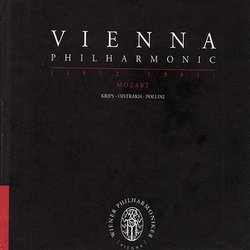Outstanding concertos
James Peyton | columbia, sc United States | 12/26/2005
(5 out of 5 stars)
"Because I know these concertos well through other recordings and performances and this is not the case with the other works on this complilation, I feel qualified to make statements regarding the piano concertos only. The Pollini performances are revelatory in their emotional freedom and range. I have always admired Pollini for his highly structured interpretations and his technical perfection. Here we have a different aspect to this pianist in his ability in an almost improvisitory manner to give us Mozart at his most ethereal and most profound momemts. I have listened to these concertos for the last month and continue to be drawn to Pollini's magnetic playing and conducting of these great works, especially the A major and the d minor. As for the sound, these cds do have some short comings; there is less presence than one would find in a studio recording, but the performances more than compensate for any hestitation a buyer may have."
Pollini shines, but the rest is one listen only
Santa Fe Listener | Santa Fe, NM USA | 09/08/2009
(5 out of 5 stars)
"The earlier reviewer locates the excellence of this 3-CD collection in Pollini's accounts of three Mozart piano concertos, and he's tactful enough to overlook the drawbacks of the other two discs. So first the good news. In 1981 Pollini shows himself to be good at the role of conductor-soloist, on the order of Murray Perahia. Both pianists rely on the excellent musicians behind them, and in Pollini's case the Vienna Phil. basically needs only a nod or two.
He returned to the same role recently in two new CDs of Mozart concertos, duplicating the earlier K. 414, but the Andante set is the only place where you can hear this great musician in K. 449 and K. 466. He's a bit tentative leading the orchestra in the big D minor concerto, but once the performance hits its stride, Pollini's account of the solo part is impressive in every way. As the earlier reviewer also points out, the style of playing is warm, flexible, and idiomatic (so are the latest recordings -- Pollini hasn't grown into a cool, aloof player of this music by any means. So much for cliche.)
The sonics provided by Austrian Radio are curious. All three concertos come from the same Nov. 15 concert, but the orchestra and soloist become noticeably more distant and reverberant in K. 449. Even then, the sound is good FM-radio quality. Pollini's account of Beethoven's fascinating cadenzas for the D minor concerto are a thrill, given that the music is as much about Beethoven as about Mozart -- Pollini gives us a glimpse at how Beethoven might have improvised at th keyboard, starting out with a few nods to Mozart's rococo classicism before launching into his own romantic keyboard style.
The other two CDs are worth a listen, at least, even if they don't rise to Pollini's level. On CD 1 a very old Josef Krips leads a traditional Mozart Requiem from 1973 that is quite appealing at first. the Wiener Singakademie exemplifies the warmth of Viennese choral singing, yet they avoid the weightiness that grows tiresome in otherwise excellent traditional readings from, say, Karajan or Bernstein. The solo quartet is also first rate: soprano Lucia Popp, here caught at her most youthful and appealing, mezzo Margarita Lilowa, tenor Anton Dermota, probably the best at the time for Mozart with Wunderlich gone, and bass Walter Berry. Individually each is strong, and they are careful to blend well in ensemble. But Krips, leading with some energy at first, loses steam, and by the time we are ired in Sussmayr's prosaic completions at the end, the final half hour declines in interest and vigor.
CD 2 features David Oistrakh as conductor in 1972, a role I think he was never very good at. This live Mozart Sinfonia Concertante with son Igor on violin and father David on viola, is virtuosic to a fault. The two soloists compete to dazzle us. There's no blending, no refinement, and certainly no Mozartean style. But if you want to hear two starry soloists going at it with extra energy and drive, here you go. I prefer the dame duo in their more restrained studio account on EMI. Oistrakh then leads the Jupiter Sym. in equally boisterous manner, and here his lack of podium skills results in too many rough edges and no stylishness, even with the greatest Mozart orchestra on earth.
On the used market this Andante package is a reasonable purchase for the Pollini disc. The elaborate hard-bound book seems rather pointless, though, and the other two discs are for Viennese nostalgists, I should think."


 Track Listings (15) - Disc #1
Track Listings (15) - Disc #1